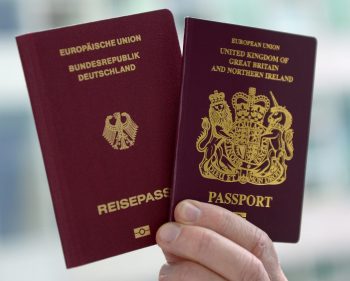
While most nationalities must denounce their nationality in order to get German citizenship, German law permits certain people to hold two citizenships in certain circumstances.
German dual citizenship can be granted in the following situations:
- Children with one German and one foreign parent, or a parent who has two citizenships, automatically acquire all the citizenships of their parents.
- Resettlers of ethnic German descent and their family members (admitted along with them) do not have to renounce their previous citizenship when they acquire German citizenship.
- Germans who acquire citizenship of another EU country or Switzerland do not automatically lose their German citizenship.
Any child who acquires German citizenship by right of being born in Germany or naturalisation and who holds citizenship elsewhere must decide by age 23 whether to retain their German citizenship or give preference to the other citizenship.
Even if you hold German dual citizenship, you are still wholly viewed as a German citizen by German law and have the same rights as any German citizen. However, if you chose to live in your home country (or any country where you hold citizenship) you will lose your right to claim German consular protection; instead, you will be viewed by your home country as one of its citizens and thus their services apply.
Having a German dual citizenship is not an easy task. You cannot have dual citizenship in Germany unless you belong to one of these groups:
- You are from an EU country or the former Soviet Union
- You are from a country which does not allow you to give up your citizenship
- You are an ethnic German
- You have parents from the U.S
- You have obtained permission from the German authorities to retain another citizenship
You could have a dual citizenship, but the country you live in determines what rights you will have. If you live in Germany, the country considers you a German citizen and you are entitled to German services and consular help. However, if you live in the country of your other citizenship, you cannot take advantage of German services and cannot get any help from the German consulate.
However, this does not mean that you can give up your obligations. In many instances, you might be required to pay taxes in both countries where you have your citizenships as well as complete military service as per German law.
Dual Citizenship USA/Germany
Based on U.S and German law, you can have a citizenship of both countries. This can happen only in the instances where the child is born to one American and one German parent. In this case, the child is not required to give up either nationality and can hold both.
However, if the child lives in the U.S, they might have the citizenship of Germany, but cannot take advantage of German services. The other way around applies as well. U.S and German dual nationals are not exempt from military service, and can be required to file taxes in both countries. In addition, they cannot enter the U.S with a German passport and the other way around. They must present the German passport to enter Germany and the U.S passport to enter the U.S.
In another case, if an American citizen applies for naturalization in Germany, the American will have to give up their U.S citizenship to obtain the German one.
Dual Citizenship Germany/UK
As is the case with dual citizenship for U.S and Germany, the same applies to Germany and the U.K. Children born with one parent from the U.K and one from Germany have the right to retain both citizenships.
With the exit of the U.K from the EU though, the matters have become more complicated for those working and living in Germany with a UK citizenship. Germany allows dual citizenships for EU nationals, but now that the U.K will not be in the EU due to Brexit, what will happen is still unclear.
It has been proposed that UK citizens get dual nationalities for Germany so that they can have freedom of movement within the EU. This remains to be solved and is up to whether Germany will allow U.K citizens who apply for German citizenship to keep their U.K citizenship too.
Giving up the German Citizenship
German rules do not allow its citizens to give up the German citizenship. More specifically, if the German citizen wants to renounce their citizenship to avoid obligation to Germany such as taxes or military service, they will not be allowed to do this. So since you cannot give up the citizenship, you can lose it under these circumstances:
- If you request it from the German authorities and another country has offered you citizenship
- If a German child is adopted by a foreigner, they will lose German citizenship
- If you join the military forces of the country where you hold another citizenship without the permission of the German authorities
- If you obtain another citizenship, you will lose the German citizenship
- If your citizenship has been obtained through naturalization and you lose it due to illegal activities
Renaturalization of German Citizenship
If you have renounced your German citizenship in the past or have lost it for reasons other than criminal activity, you can apply for renaturalization. The procedure will be the same as with those who apply for naturalization the first time, and you will have to give up all previous citizenships.
Related articles:
German Nationality Law
How to Get German Citizenship
How to Move to Germany
How to Get a Work Permit for Germany







